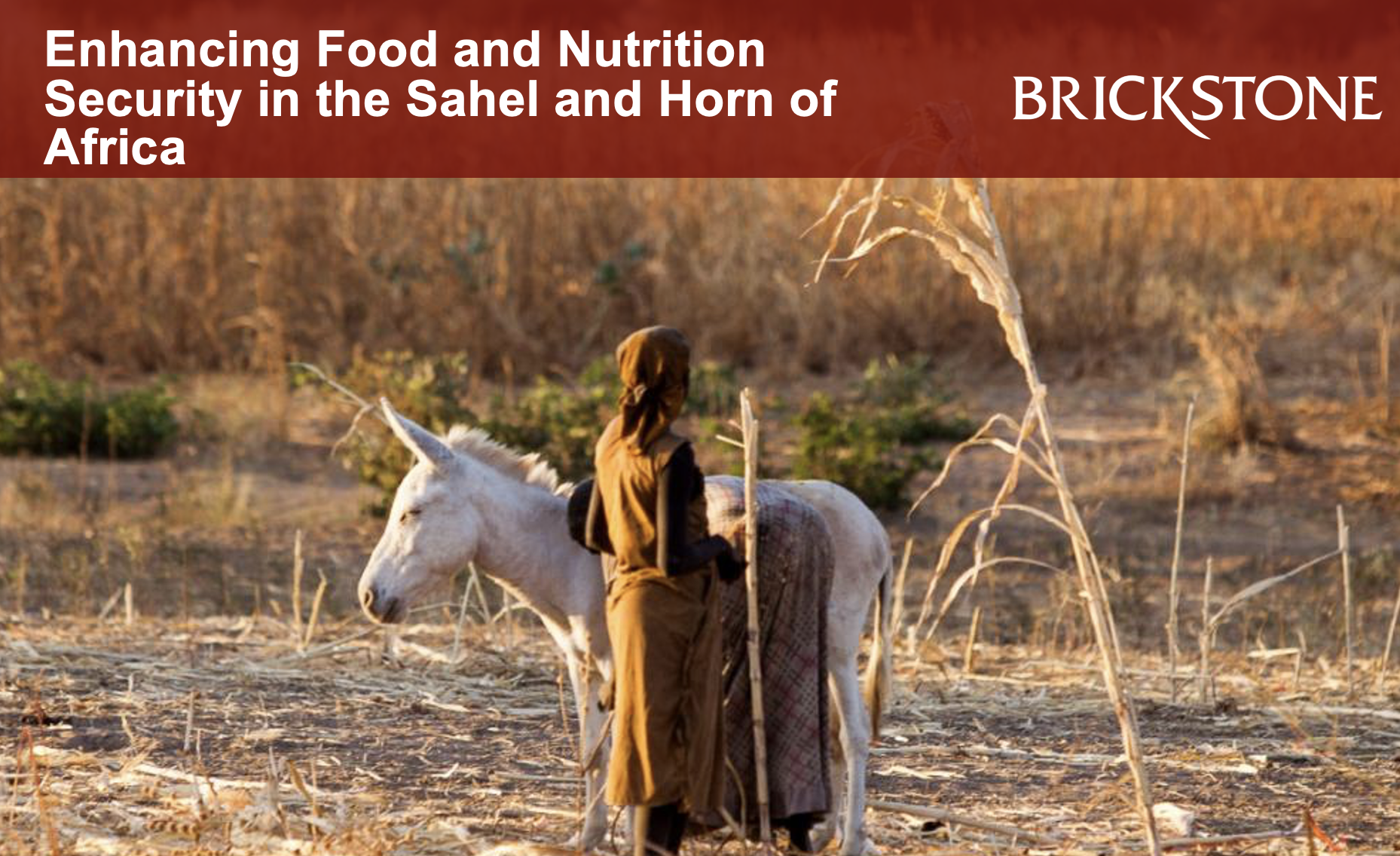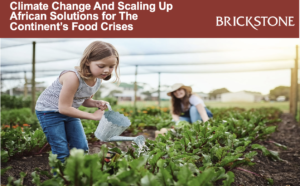Enhancing Food and Nutrition Security in the Sahel and Horn of Africa
Enhancing Global Food and Nutrition Security
The global food and nutrition crisis has been intensifying since 2014; the World Food Programme (WFP) estimates that 221 million people across 54 IDA countries are facing acutely food-insecure conditions or worse – a 71 percent increase from 2019. Food insecurity is driven by a variety of interlinked causes including instability and related population displacements, the impact of weather extremes, disrupted food systems, limited food production, barriers to regional trade, poor policy choices, and the socioeconomic fallout from the COVID-19 pandemic.
In addition, the war in Ukraine has worsened the situation, leading to increased and volatile prices for food and other commodities.
This article by Brickstone reviews the World Bank’s enhancing food and nutrition security in the Sahel and Horn of Africa, highlighting key facts and insights.
Food and Nutrition Security in the Sahel and Horn of Africa
Sub-Saharan Africa is experiencing a storm of factors – a food, fuel, and fertilizer crisis exacerbated by Russia’s invasion of Ukraine, the economic impacts of COVID-19, rising inflation and debt, and extreme weather events resulting from climate change. It’s estimated that in five countries in the Sahel known as the G5 Sahel (Burkina Faso, Chad, Mali, Mauritania, and Niger), 10.2 million people were food insecure from June to August 2023. Out of these, more than 900,000 people were in emergency situations, and in Burkina Faso and Mali more than 45,000 people faced famine.
At least 36 million people across the Horn of Africa are severely food insecure as Ethiopia, Kenya, and Somalia experience the worst drought in 40 years. In the aftermath of cyclone Freddy in 2023, Malawi and Mozambique saw the prices of food staples such as maize soar to 300 percent higher, worsening levels of food and nutrition insecurity.
In the Sahel and Horn of Africa, both regions facing a persistent food and nutrition crisis driven by drought and exacerbated by conflict and fragility, the World Bank is scaling up short- and long-term responses to boost food and nutrition security, and to strengthen the resilience of food systems. The Bank is taking a multisectoral approach, supporting countries with financing, technical assistance, and analytics.
To enhance food and national security, the World Bank is taking a multi-sectoral approach. The Bank is one of the largest sources of development finance for addressing food and nutrition insecurity, committing over $60 billion in financing from 1980 until 2022, two-thirds of which came from IDA. This trend has been sustained; in April 2022 the Bank announced a comprehensive, global response to the food and nutrition security crisis, and has scaled up its operational engagement, surpassing its initial commitment of $30 billion over 15 months for global FNS response, and making $45 billion available through a combination of $22 billion in new lending and $23 billion from its existing portfolio.
The Bank is scaling up short- and long-term responses in four areas to boost FNS, reduce risks, and strengthen food systems: (i) supporting food production and producers with an emphasis on climate resilience, nutritional values, and the inclusion of small farmers and farm workers; (ii) facilitating increased trade in food and agricultural inputs, with support for resilient supply chains; (iii) supporting vulnerable households through social protection programs and essential health and nutrition services, and (iv) investing in sustainable food and nutrition security – reducing food losses, improving food safety and hygiene in distribution channels, and better linking production and consumption centers.
To achieve this, the Bank works across sectors to provide financing, technical assistance, and analytics like rapid country diagnostics and data-based monitoring instruments. IDA financing can be used to both support countries short term food security and to invest in the resilience of the food systems, ensuring food security in the long term.
For example, two IDA interventions, the West Africa Food System Resilience Program (FSRP) and the FSRP for Eastern and Southern Africa, support 14 countries, 1 continental and 5 regional organizations with $2.4 billion increasing the resilience of the food systems. Almost 9.35 million direct beneficiaries, including farmers (with a focus on women and youth), small-scale processors, and agricultural medium, small, and micro-enterprises (MSMEs), will benefit from the FSRPs and it is planned that the financial and geographical scope of the programs will be widened.
To respond quickly to the emerging food crisis in the G5 Sahel, the World Bank has provided $422.5 million for emergency measures. This financing was available through three mechanisms, the activation of the Contingent Emergency Response Components (CERC) of WB projects, the deployment of new resources through the Crisis Response Window’s Early Response Financing (CRW ERF) and the reallocation of resources within existing projects.
The Bank has activated CERCs in four key projects that have provided a total of $82 million of rapid assistance to vulnerable populations, including two projects in Chad (the Climate Resilience Agriculture and Productivity Enhancement Projectand the Rural Mobility and Connectivity Project) and one project each in Mali (the Mali Drylands Project) and Niger (the Agriculture and Livestock Transformation project).
Moreover, additional resources to respond to crises were provided to three projects with a total financing of $323 million, including $125 million from CRW ERF resources. These include Burkina Faso’s Emergency Local Development and Resilience Project, and Niger’s Regional Sahel Pastoralism Support Project II. In Niger, $17.5 million of the Climate Smart Agriculture Support project were reallocated to financed emergency measures.
Read the full publication here.






